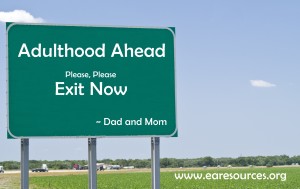I came across an article, and wanted to pass it along!
It’s not all bad; it’s also not all good.

I came across an article, and wanted to pass it along!
It’s not all bad; it’s also not all good.

 Over the past few years, the percentage of 25-to-34-year-old Americans living with their parents has been at a record high of nearly 15%. Student debt and difficulty finding a job are sending millennials back home in droves — and though this type of arrangement is certainly easier on the wallet, it can wreak havoc on a young adult’s self-image.
Over the past few years, the percentage of 25-to-34-year-old Americans living with their parents has been at a record high of nearly 15%. Student debt and difficulty finding a job are sending millennials back home in droves — and though this type of arrangement is certainly easier on the wallet, it can wreak havoc on a young adult’s self-image.
Here is the full article.
I don’t really agree with everything in the article. The article is not based upon research, but it based upon three women’s experiences. However, I do know that emerging adults have varied and complex emotions when moving back home which is partially due to societal pressure, and their desire to feel like an “adult.”
Research indicates that most parents and emerging adults enjoy their time spent at home. In his book, Arnett says, “When kids boomerang home, they bring more pleasure than pain. (Arnett, xi) The book also says that “Of the parents who have an emerging adult child living with them, 61 percent describe their feelings about it as “mostly positive” and only 6 percent describe the experience as “mostly negative.”
For this reason, it is important we redefine adulthood according to the three developmental tasks rather than where you sleep at night.
Resources:
Getting to 30 by Jeffrey Arnett and Fishel

I came across this article, and wanted to share it with my readers. Heather Krause is a statistician who works with nonprofit organizations. As you read, here are a few thoughts.
1. If you are making lunches for an emerging adult, you are not helping them, but discouraging their development (through hindering their personal autonomy).
2. Although “moving out” is considered the pinnacle marker of adulthood, it is not adequate for establishing adulthood. Assuming that proper boundaries are established, families can remain living together their entire lives.
3. The author states that she doesn’t care about doing housework that her grown children should be doing. I believe that this is due to the fact that many adults fail to redefine their lives when children move out. After years of caring for children, an empty nest requires that the individual redefine their personal lives, their marriage, and their home.
Dr. G. David Boyd
 I still remember the day that I had a fight with my parents, and told them I was moving out. I was serious. I packed my bags, and set them by the door. They could not tell me what to do. If I had to move to do my own thing, then I would.
I still remember the day that I had a fight with my parents, and told them I was moving out. I was serious. I packed my bags, and set them by the door. They could not tell me what to do. If I had to move to do my own thing, then I would.
Unfortunately, I didn’t have a car so I couldn’t leave.
I didn’t have a phone, so I couldn’t call a friend.
I didn’t have a job or money, so I couldn’t support myself.
Fortunately, my parents took me back because…
all I had was two grocery bags filled with my favorite toys.
You have been dreaming of the day you move out for the past several years, but have struggled with making that dream a reality. When day comes for you to leave your home, I hope that you are more prepared than I was. Do you know what it will take to successfully launch from your parents’ home?
The primary goal for emerging adults is not to simply move out. It is also not always more healthy or godly for emerging adults to move out. In Bible times, families often lived under one roof. It is only among affluent nations in more recent times that the concept of moving out has become so tied with an individual reaching adulthood.
Here are three areas to develop in order to ensure a successful E-VACuation.
The childhood question, “What do you want to be when you grow up?” has become central in your mind. Vocation is the means by which individuals fulfill purpose in their life. Seek to discover a vocation that gives you purpose and provides a place in the bigger picture of life. Although you might find great purpose in video games, art, or playing a sport, if it does not provide for your basic needs, you need to continue to seek work that will provide both purpose and provision.
Prepare yourself for the journey ahead. Are you seeking to discover a vocation? As an emerging adult, you need to be researching occupations, seeking opportunities for skill development, gaining work experience, and finding occupational role models. You don’t have to have your dream job to move out (if there is such a thing), but you should be making steps towards discovering a vocation.
It takes more than money in order to be able to move out of your parents’ home. The second developmental task of adulthood is to establish autonomy. Autonomy can be defined as the ability to make one’s own decisions and to deal with the consequences. You must break your dependency upon other humans (usually parents, but it could be anyone) in the decision-making process. Many emerging adults are overwhelmed by the multitude of decisions that await them as they enter adulthood.
Some parents hinder their children’s autonomy by hovering over their decisions, and protecting them from the consequences of those decisions. If your parents are hovering, ask them to allow you the freedom to take more responsibility. It is important that you develop your autonomy by learning to make wise decisions, and not asking your parents to bail you out when you are in trouble.
 The ability to develop a personal community is essential to becoming an adult. Western culture tends to support independent living, but biblical principles support inter-dependent living. God created humans for community with Him, and with one another. As you move out, you will need to develop a new community to help you in the good and bad times.
The ability to develop a personal community is essential to becoming an adult. Western culture tends to support independent living, but biblical principles support inter-dependent living. God created humans for community with Him, and with one another. As you move out, you will need to develop a new community to help you in the good and bad times.
You need to be equipped with the skills to seek and develop community. Do you have the ability to walk across the room, and make new friends? Do you have the ability to provide and receive help from others? These social skills are essential for moving out, and require practice in order to develop. Many emerging adults have spent their entire lives in one setting, and do not have experience in making new friends. Seek out new settings in order to practice your social skills, and build a strong community network.
Your day to move out will come. Don’t be caught off guard. Get your E-VAC plan in place so you are prepared.
If you are interested in hosting a seminar for your church or school, on how to develop your own E-VAC plan, please contact Dr. G. David Boyd at gdavid@earesources.org.
This winter’s weather has definitely been difficult. Most of the United States has been under extremely cold weather conditions, it is currently snowing again in my home state of Minnesota.
One city that made recent news is Atlanta. As a snow storm entered their city, the city officials did not adequately prepare for an evacuation of their city. City officials knew the storm was coming, but failed to plan. This lack of planning caused widespread confusion and chaos.
As a parent, do you have an evacuation plan for your emerging adult? The day is coming when they will need to embrace adulthood. Do you know what it will take to prepare them to leave the home in a healthy manner.
The primary goal for parents should not be to have an empty nest. It is also not always more healthy or godly for emerging adults to move out. In Bible times, families often lived under one roof. It is only among affluent nations in more recent times that moving out has become so tied with reaching adulthood.
Becoming an adult is more than moving out of their parents’ home, Emerging adults need to accomplish three tasks: Vocation, Autonomy, Community. In order to achieve a successful evacuation from your home, here are three areas to develop your E-VAC plan (Vocation, Autonomy, Community).
 The childhood question, “What do you want to be when you grow up?” becomes central in the mind of emerging adults. Vocation is the means by which the individual fulfills purpose in their life. Emerging adults are seeking to discover vocation that gives them purpose and provides a place in the bigger picture of life.
The childhood question, “What do you want to be when you grow up?” becomes central in the mind of emerging adults. Vocation is the means by which the individual fulfills purpose in their life. Emerging adults are seeking to discover vocation that gives them purpose and provides a place in the bigger picture of life.
Parents must step forward to prepare them for the journey ahead. How are we equipping our child to find purpose and provide for themselves?
Parents need to ask themselves how they can assist their child to move forward towards discovering their vocation. Providing them opportunities for skills development, occupational exploration, work experience, and role models are a few things that parents can do to help them develop.
Other parents do too much. If you are filling out job applications, then you are doing too much. You have crossed the line, if you are filling out their college applications. There is a balance to be found between directing their educational and vocational decisions, and yet letting them stand autonomous which is our second area of development for a healthy evacuation.
The second developmental task of adulthood is to establish autonomy. Autonomy can be defined as the ability to make one’s own decisions and to deal with the consequences. An individual must break their dependency upon other humans (usually parents, but it could be anyone), and make decisions that are their own.
Parents need to allow their child’s autonomy, and to encourage them as they develop. They can do this through releasing children to make decisions, working alongside them in the decision-making process, allowing children to pay for the consequences of the decisions.
Community is essential to becoming an adult, and an individual’s further development. Western culture tends to support independent living, but biblical principles support inter-dependent living. God created humans for community with Him, and with one another.
Parents should seek to equip adolescents with the skills to seek and develop community. These social skills are essential for the maturation process. They can do this through forcing children out of their social comfort zones, placing them in intergenerational environments, teaching them social skills.
Don’t be caught off guard. Get your E-VAC plan in place.
If you are interested in hosting a seminar for your church or school, on how to develop your own E-VAC plan, please contact Dr. G. David Boyd at gdavid@earesources.org.